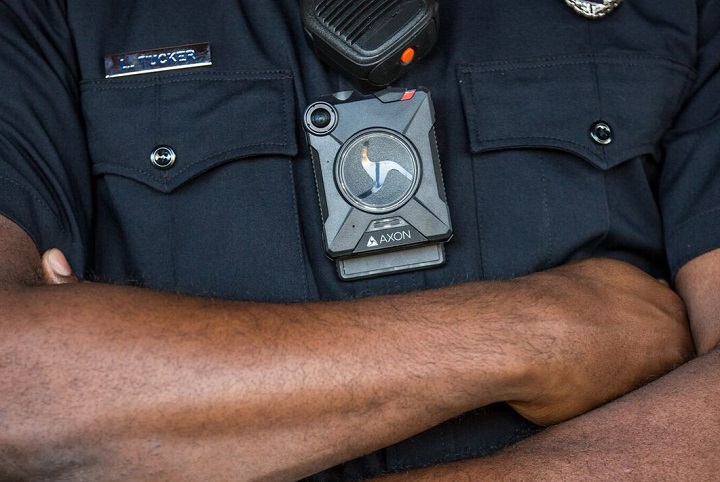Calgary police officers patrolling the streets have a new tool in their belt: body-worn cameras.

For the first time, all front-line officers are wearing the cameras, which the police service says adds a new layer of both safety and transparency to policing in the city.
“It’s been a pretty good experience. I think our officers are loving them,” Staff Sgt. Travis Baker, operational lead for the body-worn camera project, said on Wednesday.
“I hear from many of our officers that they don’t want to go out without them.”
Baker said when it comes to having an accurate representation of any interaction, having raw video is unmatched.
“No matter how good an officer can write notes or no matter how articulate they are, there’s no way to capture what a video does,” he said.
Baker said the video footage can serve a number of purposes, including providing: additional evidence that can be presented at court, evidence that could be handed to the professional standards section in the event of a complaint or context should a police watchdog investigation be launched following an interaction with the public.
WATCH (July 2018): Front-line officers wearing body-worn cameras on the streets of Calgary as new program roll-out begins.

Baker said it’s an easy process for officers to hand over video evidence to the courts if necessary, adding that both police and the Crown would vet that video for any personal information that may have been disclosed by a member of the public.
If a citizen wants a copy of a video interaction with a police officer that isn’t criminal in nature, Baker said they have to go through the Freedom of Information Act.

Get breaking National news
Rolling while responding
Any time a Calgary police officer is responding to a call, Baker said they’re expected to have the camera rolling. The cameras typically have a red light blinking when they’re recording.
“We want that de-escalation. We want people to know they’re being recorded,” Baker said.
“It keeps our officers honest; they know they’re being recorded.”
Baker said the cameras help with what he called a “huge dynamic change in how the police deal with the public and the public perception of what the police is.”
In an age where nearly everyone has a cell phone or another way to record video, those videos often wind up online in fragments and are harder to verify and therefore use as part of an investigation. With the body-worn cameras, investigators get the entire incident.
“I think that that transparency and accountability of the officers to the public that we serve is a huge piece that we get,” he said.
Baker added that when it comes to taking people’s accounts of an incident — whether it’s a responding officer, a witness or a person involved in an incident — “memory and the account of a situation always changes.” The footage captured by body-worn cameras never changes.
“It is a powerful, powerful investigative tool,” Baker said. “It’s an independent witness that has no bias. It has no judgment. It just captures audio and video.”
Baker said in addition to capturing negative interactions or incidents, the body-worn cameras also capture “hero moments” involving regular citizens jumping into action, which he said highlights the good-natured people that live in Calgary.
While Baker couldn’t comment on the total budget for the body-worn camera project, he said the technology was accounted for before the recent City of Calgary budget and service cuts.


Comments
Comments closed.
Due to the sensitive and/or legal subject matter of some of the content on globalnews.ca, we reserve the ability to disable comments from time to time.
Please see our Commenting Policy for more.